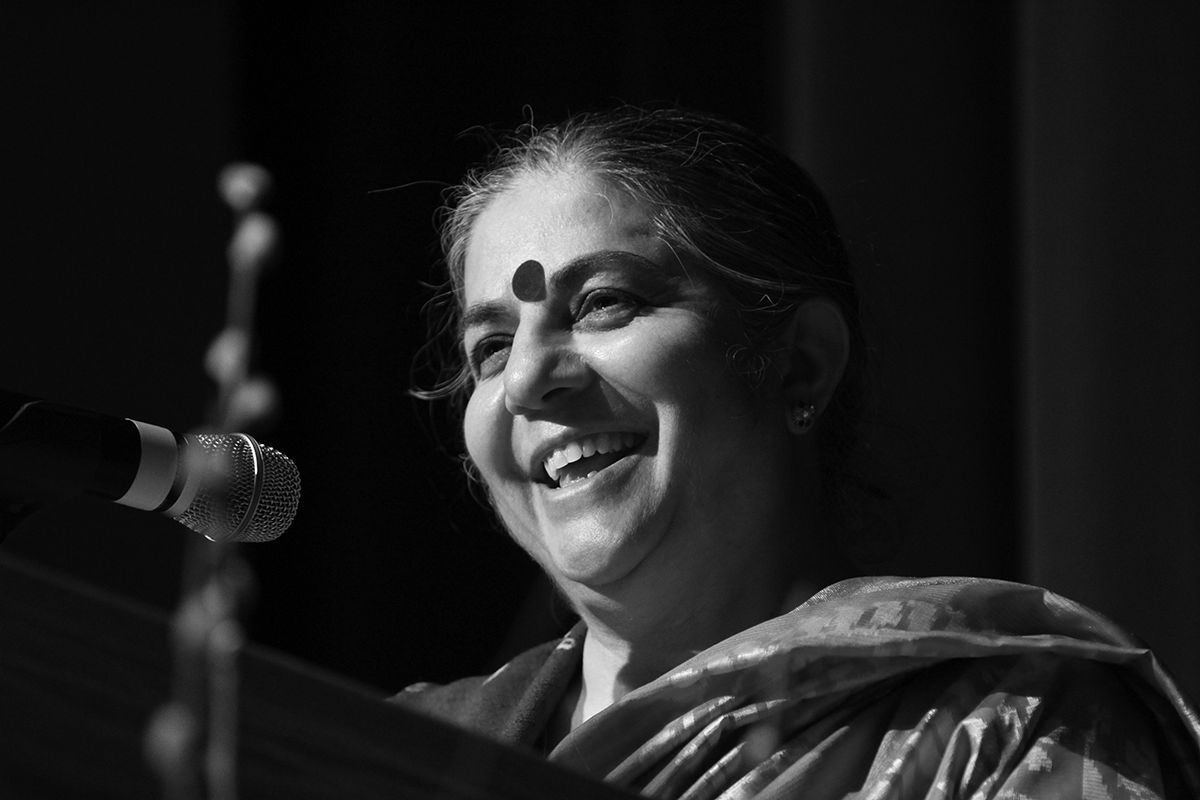
by Margaret Hallock, Director, Wayne Morse Center for Law and Politics
“The future of food needs to be reclaimed by women, shaped by women, and democratically controlled by women. Only when food is in women’s hands will both food and women be secure.”—Vandana Shiva, Staying Alive: Women, Ecology and Development, introduction to 2010 edition by South End Press
Dr. Vandana Shiva, internationally respected author and activist, visited the UO as occupant of the Wayne Morse Chair of Law and Politics during winter quarter 2011. She headlined a major conference on Food Justice: Community, Equity and Sustainability sponsored by the Wayne Morse Center for Law and Politics and cosponsored by CSWS. The conference, held February 19-22, 2011, attracted over two thousand university and community participants and highlighted the growing food justice movement.
In numerous appearances at the conference and around the community, Shiva inspired food activists with her call for a return to authentically community-based food systems that lead to food security. Shiva has spent her career as a scientist and activist battling the globalization of agriculture, driven by agribusinesses seeking global markets for their non-renewable seeds, fertilizers and pesticides.
Her crusade is a feminist crusade. “Ecology and feminism are inseparable for me,” she states. Why? Because women are the world’s major food producers. “Most food producers, farmers, in the world are women, and most girls are future farmers.” For millennia women have been preserving seeds, maintaining genetic diversity, and producing healthy and sustainable food. Women’s knowledge and livelihoods, and the security of their families, are threatened by the growth of commercialized and privatized seeds and “sanitized” packaged foodstuffs. Dr. Shiva rails against Monsanto and other corporate giants who patent ancient wheat seeds and then require farmers to purchase new seeds every year. Shiva created Navdanya, or “9 Seeds” in India to work with farmers to save seeds and reduce their dependence on global agriculture for seeds, fertilizers, and pesticides, which has lead to an epidemic of debt and farmer suicides in India. In her recent edition of Staying Alive: Women, Ecology and Development, Shiva demonstrates the many ways that the politics of the food system is gendered.
Vandana Shiva has helped spark a movement of food activists—farmers, scientists, activists, and intellectuals—who are bringing a new food system into being, a system in which agriculture belongs to the commons. But she is quick to remind us that this movement must be tied to issues of gender equality and environmental justice. It is not enough for rich countries to create local agriculture systems when so many in the world, particularly women, suffer food insecurity. Her ethics demand an alternative to the structural adjustment policies of international organizations and authentic food systems that create food security and environmental and social justice.
Dr. Shiva is also a prolific and admired writer having authored dozens of books, including Soil Not Oil: Environmental Justice in an Age of Climate Change (South End Press, 2008); Earth Democracy: Justice, Sustainability, and Peace (South End Press, 2005), Water Wars: Pollution, Profits, and Privatization (South End Press, 2001), Stolen Harvest: The Hijacking of the Global Food Supply (South End Press, 2000), Biopiracy: The Plunder of Nature and Knowledge (South End Press, 1997), and Monocultures of the Mind (Zed, 1993).

